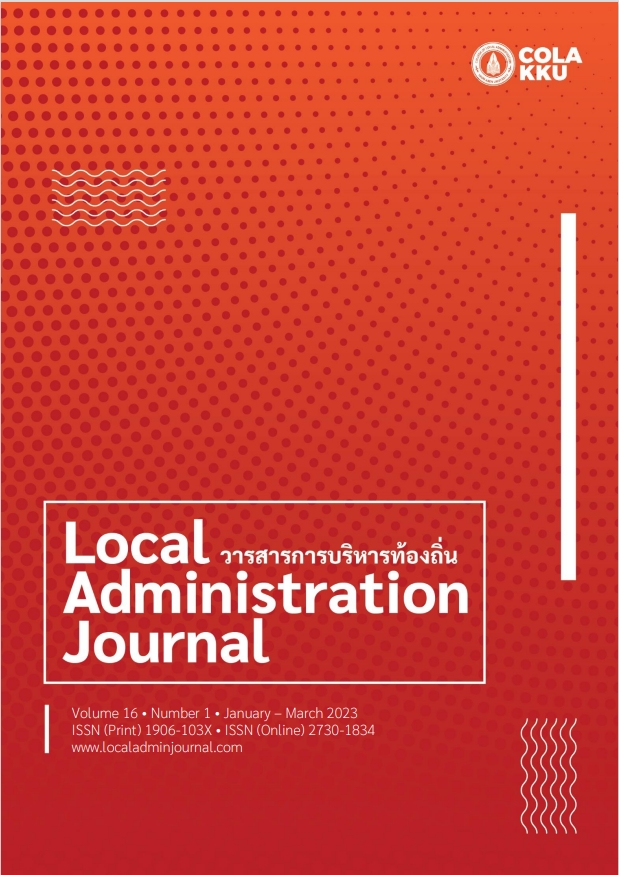Collaboration and Citizen Engagement: Exploring the Variety of Policy Actors Driving the Learning City
DOI:
https://doi.org/10.1234/laj.v15i1.254249Keywords:
Citizen engagement, collaborative governance, learning city, local governance, networkingAbstract
This study on collaboration and citizen engagement had the objective to study the network format and building citizen engagement in driving the learning city by focusing on expression through diversified policies. It used qualitative methods based on phenomenology. The data were analyzed by building an induction summary and by building a general summary with empirical observation and using interpretation. The study unit at the organizational and personal level was 38 providers of important data around Kalasin Municipality. It was found that there were two types of cooperation. First, authority collaboration, which has three sub-forms: (1) intra-division collaboration, (2) organizational collaboration, and (3) inter-organization collaboration, an integrated cooperation between two or more agencies. Second, co-sponsorship, a cooperation format of driving the learning city in the form of a supporting network and building citizen engagement. While the latter has no clear and outstanding project operation in driving citizens, it has potential by focusing on citizen development based on local social capital that could promote engagement and bring pride in their own area to the citizenry.
References
เอกสารอ้างอิง
ภาษาไทย
พิมพ์ลิขิต แก้วหานาม และกตัญญู แก้วหานาม. (2560). แนวทางการขับเคลื่อนสำนึกความเป็นพลเมืองของประชาชนในเทศบาลเมืองกาฬสินธุ์ จังหวัดกาฬสินธุ์. วารสารการบริหารปกครอง, 9(1), 144-167.
สุภางค์ จันทวานิช. (2547). วิธีการวิจัยเชิงคุณภาพ. กรุงเทพฯ: สำนักพิมพ์แห่งจุฬาลงกรณ์มหาวิทยาลัย.
ภาษาอังกฤษ
Benson, D., Lorenzoni, I., & Cook, H. (2016). Evaluating social learning in England flood risk management: an ‘individual-community interaction perspective. Environmental Science & Policy, 55(2016), 326-334.
Boyne, G.A. (2003). What Is Public Service Improvement. Public Administration, 81(2), 211–227.
Broccardo, L., Culasso, F. & Mauro, S.G. (2019). Smart city governance: exploring the institutional work of multiple actors towards collaboration. International Journal of Public Sector Management, 32(4), 367-387.
Bianchi, C., Nasi, G. & William, C. (2021). Implementing collaborative governance: models, experiences, and challenges, Public Management Review. Taylor & Francis Online.
Craig, A. W. (2017). Policy Collaboration in the United States Congress. Doctoral dissertation for Philosophy in Political Science, Ohio State University.
Dale, A., Burch, S., & Robinson, J. (2018). Multi-level governance of sustainability transitions in Canada: Policy alignment, innovation, and evaluation. In Climate Change in Cities: Innovations in Multi-Level Governance, Editors S. Hughes, E. Chu and S. Mason. Springer
Edmons, W.A., & Kennedy, T.D. (2017). An applied guide to research designs: quantitative, qualitative, and mixed methods. Thousand Oaks: Sage.
Fowler, J.H. (2006). Connecting the Congress: A Study of Cosponsorship Networks. Political Analysis, 14(4), 456–487.
Hammad, R., & Ludlow, D. (2016). Towards a Smart Learning Environment for Smart City Governance. 2016 IEEE/ACM 9th International Conference on Utility and Cloud Computing (UCC). (pp.185-190). Shanghai, China.
Kabir, S. (2017). Learning Cities and the SDGs: A Guide to Action. Hamburg, Germany: UNESCO Institute for Lifelong Learning (UIL).
Klijn, E.H.(2012). New Public Management and Governance: A Comparison. In The Oxford Handbook of Governance, edited by D. Levi-Faur, 201–214. Oxford: Oxford University Press.
Klijn, E. H., & Joop, K. (2015). Governance Networks in the Public Sector. London: Taylor & Francis Group.
Lee, T. (2019). Network comparison of socialization, learning and collaboration in the C40 cities climate group. Journal of Environmental Policy & Planning, 21(1), 104-115
Lawrence, T. B., Leca, B., Zilber, T.B. (2013). Institutional Work: Current Research, New Directions and Overlooked Issues. Organization Studies, 34(8), 1,023-1,033.
Michel, H. (2005). e-Administration, e-Government, e-Governance, and the Learning City: A typology of Citizenship management using ICTs.The Electronic Journal of e-Government, 3(4), 213-218.
Medema. W, Wals, A. & Adamowski, J. (2014). Multi-Loop Social Learning for Sustainable Land and Water Governance: Towards a Research Agenda on the Potential of Virtual Learning Platforms. NJAS: Wageningen Journal of Life Sciences, 69(1), 23-38.
Osborne, S.P. (2010). The (New) Public Governance: A Suitable Case for Treatment?.” In The New Public Governance? Emerging Perspectives on the Theory and Practice of Public Governance. edited by Stephen P. Osborne, 1–16. London: Routledge.
Torfing. J. (2012). Governance Networks in The Oxford Handbook of Governance, edited by D. Levi-Faur, 99–112. Oxford: Oxford University Press.
United Nations Educational, Scientific and Cultural Organization (UNESCO). (2020). The UNESCO Global Network of Learning Cities welcomes 54 new member cities from 27countries. Retrieved from https://uil.unesco.org/lifelong-learning/learning- cities/unesco-global-network-learning-cities-welcomes-54-new-member.
World Bank. (2018). The Human Capital Project. Washington DC: World Bank. Retrieved from https://openknowledge.worldbank.org/handle/10986/30498.
Worku, Y.G., & Tessema, G.A. (2018). Public -private collaboration in the Tourism Industry in Northwestern Ethiopia. African Journal of Hospitality, Tourism and Leisure, 7(2), 1 – 12.
Zhang, R., Lv, Q., Li, J., Bao, J., Liu, T., Liu, Sh. (2022). A reinforcement learning method for human-robot collaboration in assembly tasks. Robotics and Computer-Integrated Manufacturing. 73(2022), 102227. Retrieved from https://www.sciencedirect.com/ science/article/pii/S0736584521001095
Translated Thai References
Kaewhanam, P., & Kaewhanam, K. (2020). Guidelines for Driving Citizenship Awareness of Peoples in Kalasin Municipality, Kalasin Province. Governance Journal, 9(1), 144 - 167. (in Thai)
Chantavanich, S. (2004). Qualitative research methods. Bangkok: Chulalongkorn University Press. (in Thai)
Downloads
Published
How to Cite
Issue
Section
License
Copyright (c) 2022 Local Administration Journal

This work is licensed under a Creative Commons Attribution-NonCommercial-NoDerivatives 4.0 International License.
The copyright of all articles published in the Local Administration Journalis owned by the College of Local Administration, Khon Kaen University.



